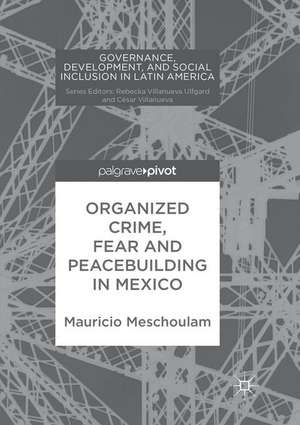Organized Crime, Fear and Peacebuilding in Mexico: Governance, Development, and Social Inclusion in Latin America
Autor Mauricio Meschoulamen Limba Engleză Paperback – 11 ian 2019
| Toate formatele și edițiile | Preț | Express |
|---|---|---|
| Paperback (1) | 351.23 lei 38-45 zile | |
| Springer – 11 ian 2019 | 351.23 lei 38-45 zile | |
| Hardback (1) | 418.83 lei 6-8 săpt. | |
| Springer International Publishing – 11 iul 2018 | 418.83 lei 6-8 săpt. |
Din seria Governance, Development, and Social Inclusion in Latin America
-
 Preț: 545.03 lei
Preț: 545.03 lei - 18%
 Preț: 945.62 lei
Preț: 945.62 lei - 15%
 Preț: 650.37 lei
Preț: 650.37 lei -
 Preț: 418.83 lei
Preț: 418.83 lei -
 Preț: 487.75 lei
Preț: 487.75 lei -
 Preț: 387.38 lei
Preț: 387.38 lei - 15%
 Preț: 637.93 lei
Preț: 637.93 lei -
 Preț: 421.55 lei
Preț: 421.55 lei -
 Preț: 458.61 lei
Preț: 458.61 lei -
 Preț: 379.09 lei
Preț: 379.09 lei - 18%
 Preț: 729.36 lei
Preț: 729.36 lei - 15%
 Preț: 523.72 lei
Preț: 523.72 lei - 15%
 Preț: 477.40 lei
Preț: 477.40 lei - 15%
 Preț: 695.01 lei
Preț: 695.01 lei -
 Preț: 323.45 lei
Preț: 323.45 lei - 18%
 Preț: 727.00 lei
Preț: 727.00 lei
Preț: 351.23 lei
Nou
Puncte Express: 527
Preț estimativ în valută:
67.22€ • 69.99$ • 56.81£
67.22€ • 69.99$ • 56.81£
Carte tipărită la comandă
Livrare economică 03-10 martie
Preluare comenzi: 021 569.72.76
Specificații
ISBN-13: 9783030069391
ISBN-10: 3030069397
Dimensiuni: 148 x 210 mm
Greutate: 0.21 kg
Ediția:Softcover reprint of the original 1st ed. 2019
Editura: Springer
Colecția Palgrave Pivot
Seria Governance, Development, and Social Inclusion in Latin America
Locul publicării:Cham, Switzerland
ISBN-10: 3030069397
Dimensiuni: 148 x 210 mm
Greutate: 0.21 kg
Ediția:Softcover reprint of the original 1st ed. 2019
Editura: Springer
Colecția Palgrave Pivot
Seria Governance, Development, and Social Inclusion in Latin America
Locul publicării:Cham, Switzerland
Cuprins
1.Chapter
1:
Introduction
2.Chapter
2:
Terrorism
and
Fear:
Their
Impact
on
Social
and
Democratic
Development
2.1Terrorism:
Violence
as
a
Vehicle
for
Communication
2.2The
Drivers
of
Terrorism
2.3The
Impact
of
Fear
on
Democratic
Development,
Human
Rights
and
Inclusion
2.4Multidirectional
Effects
2.5The
Role
of
the
Media
2.6Conflict,
Victimization
and
Democratic
Processes
3.Chapter
3:
Terror
and
Fear:
The
Mexican
Case
3.1The
Evolution
of
Organized
Crime
and
Violence
in
Mexico
Since
2006
3.2Terrorism,
Quasi-Terrorism
or
Terrorist
Tactics?
4.Chapter
4:
Violence
and
Its
Psychosocial
Effects
in
Mexico
4.1Introduction
4.2Background
4.3The
Nature
of
Our
Research
4.4Results
4.5Trauma
Caused
by
Learning
about
an
Incident:
The
First
Signs
of
the
Role
of
the
Media
4.6Other
Results
and
Symptoms
4.7Comparing
Our
Research
and
Other
Studies
and
Discussions
4.8Conclusions
and
Initial
Recommendations
5.Chapter
5:
Social
Construction
of
Fear:
The
Role
of
Experience,
Observation
and
Conversation
5.1Qualitative
Methodology
5.2The
Conceptual
Framework
5.3Phase
1:
A
Mexico
City
Neighborhood
5.4Phase
2:
Expanding
the
Study
5.5Phases
1
and
2
Findings:
Own
Experience,
Oral
Conversation
and
Experiences
of
People
Close
to
Participants
5.6The
Fear
Factor
5.7Phase
3:
Company
X,
A
Business
Run
Differently
5.8The
Study
at
Company
X
5.9Results
of
the
Company
X
Employee
Study
(Phase
3)5.10Low
Variations
between
the
Company
X
Employee
Study
(Phase
3)
and
the
Other
Studies
(Phases
1
and
2)
5.11Contrasting
the
Three
Phases
of
our
Qualitative
Investigation
5.12What
Can
Be
Gleaned
from
the
Accumulation
of
Results
6.1Conceptual
Framework:
The
Mass
Media
and
Peacebuilding
6.2Phase
4:
Methodology
and
Sampling
6.3Results
6.4What
distanced
participants
from
the
media?
6.5What
attracted
participants
to
certain
mass
media?
6.6Social
Media
6.7Connecting
the
Four
Phases
of
the
Qualitative
Investigation
and
the
PTSD
Study
6.8Fear,
Peacebuilding
and
Democratic
Development:
What
the
Findings
Say?
7.Chapter
7:
Public
Policy
Proposals
and
General
Recommendations
7.1Delving
Further
into
the
Research
7.2General
Recommendations:
Valuing
the
Importance
of
Local
Measures
7.3Recommendations
Related
to
Mass
Media
8.Chapter
8:
Summary
and
Conclusions.
Notă biografică
Mauricio
Meschoulam is
Professor
at
Universidad
Iberoamericana,
Mexico.
Textul de pe ultima copertă
The
book
focuses
on
the
psychosocial
effects
that
organized
crime
related
violence
has
produced
in
Mexico.
It
connects
one
of
the
major
worries
of
our
times
–
terrorism
–
with
the
conditions
of
peacelessness
that
prevail
in
Mexico.
Specifically,
the
project
explores
the
role
played
by
fear
as
a
peace
disruptor,
as
well
as
one
of
the
most
important
obstacles
to
social
and
democratic
development,
and
inclusiveness.
The
volume
contributes
to
the
debate
on
whether
the
escalation
of
violence
in
Mexico
since
2006
has
produced
circumstances
similar
to
those
countries
that
suffer
terrorism,
and
to
what
degree
that
discussion
can
help
in
the
construction
of
a
more
democratic
and
inclusive
society.
Mauricio Meschoulamis Professor at Universidad Iberoamericana, Mexico.
Mauricio Meschoulamis Professor at Universidad Iberoamericana, Mexico.
Caracteristici
Establishes
the
framework
for
psychosocial
comparisons
between
Mexico
and
countries
that
experience
terrorism
Engages with research from the Mexico Research Center for Peace with the goal of furthering discussions
Explores the role played by fear as a disruptor of peace in Mexico
Engages with research from the Mexico Research Center for Peace with the goal of furthering discussions
Explores the role played by fear as a disruptor of peace in Mexico
Descriere
Prospects
for
Social
and
Democratic
Development
